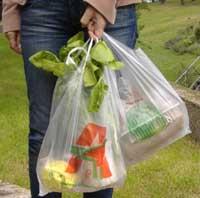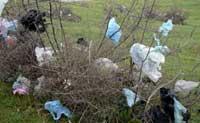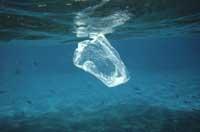Goodbye Plastic Bag

However, the problem that generates this excessive consumption is not any. If we look at ourselves, we can observe the consumption of these bags. Habits vary little by little, sometimes over the years, and sometimes with laws. The latter is the current case. In fact, plastic bags are news lately and parliaments in some states have passed regulations a few months ago to reduce their use. In the case of Hego Euskal Herria, for example, the law establishes that by 2010 consumption of them must be halved completely before 2015.
Thus, several supermarkets and shops in Hego Euskal Herria have adopted measures to reduce the use of plastic bags. For example, Eroski deducts a euro cent for each bag of virgin plastic. That is, at tolls, buyers are discounted a cent for each plastic bag they do not take.

On windy days, the usual image is to watch one (or more) plastic bag fly.
400 years of degradation
To understand the scope of the problem, there are only two data. On the one hand, a plastic bag takes 400 years to degrade, that is, to get rid completely. We know that the plastic bags delivered to us in stores are very light, with an average weight of 7 grams per bag. Therefore, they are easily dispersed. For example, on windy days, the usual image is to watch one (or more) plastic bag fly.
On the other hand, the information released by the United Nations is also serious: a kilometer of salt water, approximately 18,000 floating plastic units, in a certain direction and without control. The Mediterranean Sea is the largest plastic warehouse in the world. Fish drown because the digestive system is filled with plastic. Birds eat them as fish. Thus, plastic causes thousands of deaths.
Undoubtedly, pollution is very evident, striking, although in weight there are less waste than others.
Each of us uses an average of 234 plastic bags a year, about 2 kg. Consumption is similar in neighboring countries, at least among those who have not taken action against plastic bags.
The issue of plastic bags is currently on the agenda of most countries. In China and Kenya, for example, they are prohibited. And soon in Europe it will also be difficult to get free bags in stores.

Fish drown because the digestive system is filled with plastic (Photo: NOAA).
Are there substitutes?
The light plastic bags that the stores give us are made of polyethylene. Polyethylene is a derivative of oil, like most synthetic polymers. Ethylene, which is the basic component of polyethylene, is extracted from oil. By repeated reaction to ethylene long carbon chains of polyethylene are obtained. There are several types of polyethylene. Lightweight, robust and very economical bag. All possible spare parts that have appeared so far are more expensive than polyethylene bags and do not have the characteristics of polyethylene bags. But as the goal is to minimize the use of plastic bags, we can go shopping with the cloth bags we have stored at home.
Published in 7K.
Buletina
Bidali zure helbide elektronikoa eta jaso asteroko buletina zure sarrera-ontzian








